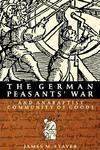
Book Summary
James Stayer argues that Anabaptist community of goods continued the popular radicalism of the early reformation and the peasants' War of 1525. During the German reformation hundreds of thousands of commoners were mobilized by the hope that established clerical and aristocratic order could be replaced by justice and equity based on the divine law of the Bible. After the defeat of the commoners in the peasants' war, some of the most ardent adherents of social and religious reform attempted to achieve these same aspirations by trying to implement the apostolic model of Acts 2 and 4 through the Anabaptists. Thus, as Stayer reveals, the peasants' war was an essential formative experience for many of the original leaders of Anabaptism. In the late 1520s, persecution drove many Anabaptists to Moravia where, throughout the 16th century, they continued the commoners' resistance to privilege in church and state. Stayer argues that in Munster, however, where there had been no peasants' war and where urban notables were prominent in the Anabaptist leadership, Anabaptist communism was badly corrupted. The historical continuities which Stayer establishes between the peasants' war and Anabaptism in Switzerland, south Germany, and Moravia can in part explain this contrast.
Book Details
| Book Name | The German Peasants' War And Anabaptist Community Of Goods |
| Author | James M. Stayer |
| Publisher | Mcgill-queen's University Press (Jan 1994) |
| ISBN | 9780773511828 |
| Pages | 258 |
| Language | English |
| Price | 1524 |








